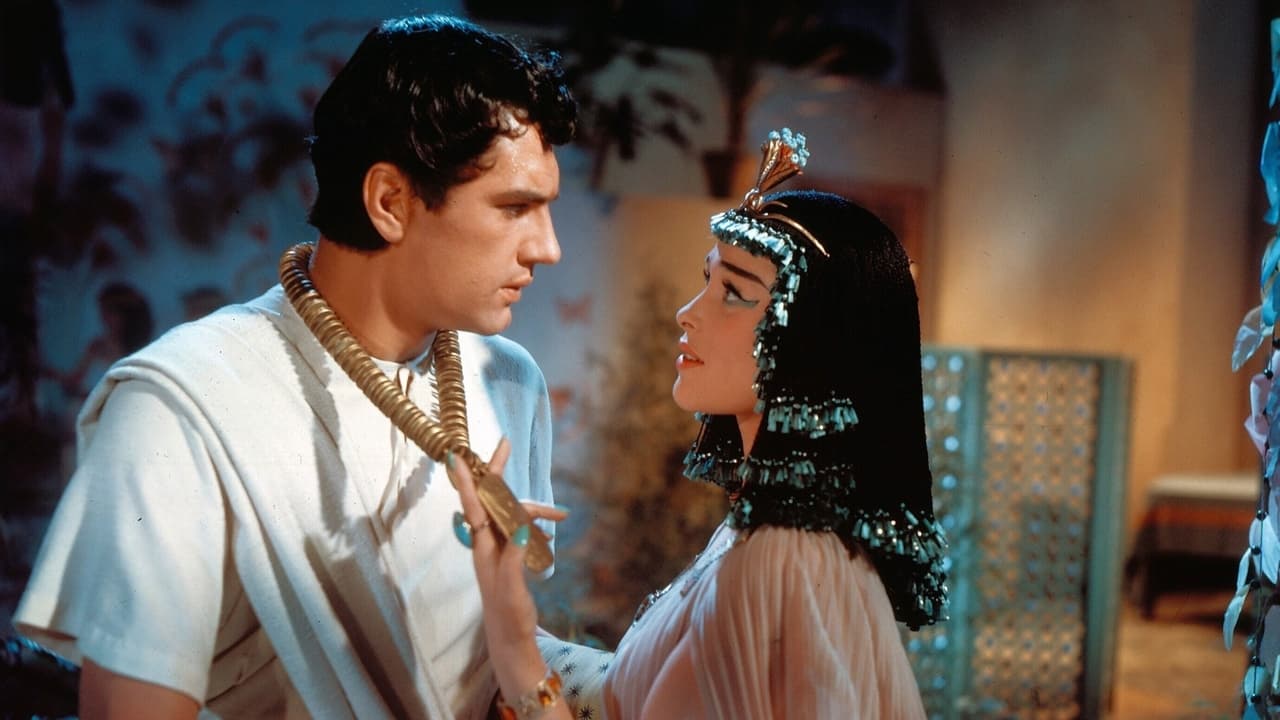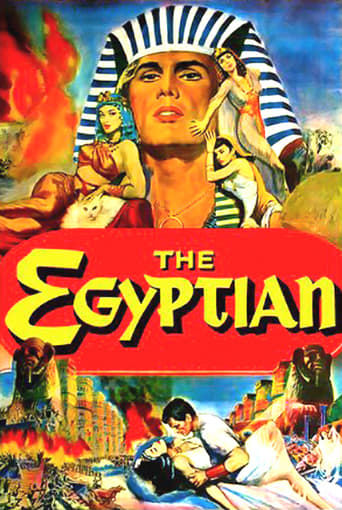

This is How Movies Should Be Made
... View MoreInstant Favorite.
... View MoreExpected more
... View MoreExcellent and certainly provocative... If nothing else, the film is a real conversation starter.
... View MoreThere were many Egyptian, Roman, and biblical epics that came out of the 1950s, most of them in Technicolor and with a very long running time. The Egyptian is both in Technicolor, and runs almost two and a half hours, but it's incredibly boring. It reminded me of what people who don't like old movies must have seen to give them that opinion.An Egyptian—hence the title—is a talented doctor, and he gets recruited to work for the Pharaoh. He becomes entranced with an alluring, but very difficult to understand, woman and refuses to listen to his friends Victor Mature, Jean Simmons, and Peter Ustinov, when they tell him she's no good. It's very tiresome.The plot drags on and on, following the life choices of the doctor, but it just isn't very interesting. If the pace was quicker, or the actors had been given an extra dose of caffeine between takes, the movie might have stood a chance. As it is, feel free to skip it.
... View MoreThe cast is excellent, with Michael Wilding presenting the most convincing performance as the Pharaoh Ekhnaton in the difficult dilemma of being 13 centuries before his time, which actually was historically correct. All the rest is fantasy, although mummies were made indeed and most indefatigably in Egypt for three millennia, it was their prominent speciality, by the help of opening the brain in a kind of prehistoric brain surgery. The protagonist's father excels in this medical art and passes it on to his son, who makes his fortune at the court of Pharaoh, who occasionally suffers from headaches and epileptic fits, so he needs his brain physician. Victor Mature plays Sinuhe's best friend, the more pragmatic and less altruistic coming leader of the future in battles and slaughters, called Horemheb, while Gene Tierney also makes a credible and politically more realistic sister to a Pharaoh only good for sun- and star-gazing. Bella Darvi plays another important part as the ruin of the hero physician, who makes a total mess of his so promising career by reckless passion. Peter Ustinov saves him time and time again only to lose him in the end. Finally there is Jean Simmons, the real heroine of the tale and the only actual martyr among them all, who represents all that they should be living for, presenting that meaning of life that Sinuhe so eagerly quests for, which he ignores as the stupid fool he is. The music of Bernard Herrmann and Alfred Neuman is also apt and perfect all the way like the splendid photography and Michael Curtiz' direction, - so what then is so wrong about this film?It's the story itself that is not at all convincing. All the weakness is found in Mika Waltari's novel, an interesting story by all means, but he understood nothing about Egypt. Another author who wrote novels of ancient Egypt was Joan Grant, whose versions are as almost palpably credible as Waltari's is more like science fiction. Not even the dialogue is good, although the film has improved it by cutting as much of the nonsense as possible. Still, some of the best episodes of the book are missing from the film, above all Sinuhe's adventures in Crete.It's a good film, nothing bad could be said about it, and we must try to forgive Mika Waltari's weakness for fantasizing in the manner of Edgar Rice Burroughs, Flash Gordon and Cecil B. DeMille rather than trying to actually recreate ancient Egypt. Ultimately, only Michael Wilding remains truly convincing.
... View MoreAs a die-hard fan of film pepla from the silent era through the golden age of widescreen epics of the 1950s and 1960s, I applauded the release several years ago, at last, by Twilight Time, of Michael Curtiz' The Egyptian (1954) on DVD and Bluray. The restoration is gorgeous, long overdue, and much appreciated. However, and I have been meaning to set this right for several years, the accompanying commentary track by film historians Alain Silver and James Ursini, both nominal specialists on the noir style, is often egregiously inaccurate, and was apparently not vetted at all by any editorial hand.First, the positives: it's true that the novel The Egyptian by Finnish writer Mika Waltari is one of the best of its kind, and that before he wrote it, Waltari had become famous in Finland as a popular and successful writer of noir-ish crime thrillers. The thread of noir in the film is astutely observed by Silver and Ursini, and as they say, resulted in a conflicted, isolated title character who was not the typical stuff of a heroic lead in a costume epic. This resulted in poorish box office and 20th Century Fox held back re- leases of the costly film, giving it its cult air. All that is true enough. And they comment sagely about the casting woes with Marlon Brando, who exited the film after day one of shooting, as well as the sad career trajectory of Bella Darvi and her involvement with the Zanucks (to Silver's and Ursini's credit, they praise her oft-derided performance as Nefer as striking just the right note of exotic detachment), and the excellent casting of Michael Wilding, Gene Tierney (more career and personal difficulties lay in her future at the time), the gorgeous production values, the 11th-hour casting of Edmund Purdom as Sinuhe, and the effectiveness of the classic score by Alfred Newman and Bernard Hermann. And about there, their combined credibility ceases, for all of that information is (and has been) readily known and available to any interested parties who can use a library or Google.Now, the negatives: For starters, they insist the film was a "sequel" to Fox's huge hit and first widescreen production, The Robe. No, the sequel to The Robe was Demetrius and The Gladiators. Period. For sure, The Egyptian was meant to jump on the widescreen bandwagon of quasi-religious, historical epics, but a sequel it was not. Especially since the events of The Egyptian take place millennia before the events of The Robe.They claim that Peter Ustinov's character of the lovable scoundrel servant Kaptah is a total invention of the screenwriters and that he never appears in the book. I have my well-worn edition (Putnam, 1949) of the book with me as I type, and Kaptah makes his first appearance on page 75. While still plunging ahead with their "sequel to The Robe" idee fixe, they cite the casting of Jean Simmons and Peter Ustinov as components of that plan by Fox, continually praising Ustinov's performance as Nero, apparently in The Robe. Really? Ustinov was Nero in MGM's 1951 mega hit Quo Vadis. The mad emperor of The Robe was Caligula, memorably played by Jay Robinson in that film as well as it's sequel, Demetrius and the Gladiators. Nero was not even in power during the events of The Robe. While discussing the (eventually) stalled career of Purdom, they omit any reference to his being cast as the title lead in MGM's widescreen epic entry of the following year, The Prodigal, as well as Mature's affinity for the role of Horemheb via not only his accomplishments as a tough guy action hero, the antithesis of Sinuhe, but his own spectacle credentials as well, viz. DeMille's 1949 biblical hit, Samson and Delilah. I am happy to observe that in the Wikipedia entries on both Mr. Silver and Mr. Ursini, The Egyptian is omitted from their list of credits as DVD commentators, for their work is unaccountably shoddy and poorly executed. Twilight Time: As the 3,000 run limited edition of The Egyptian was clearly a hit (all copies gone) don't you think it's time for another re-issue, and with a commentary track that is worthy of the film?
... View More...as valuable as King Tut's tomb! (OK, maybe not THAT valuable, but worth hunting down if you can). I notice no one has commented on this movie for some years, and I hope a fresh post will spark some new comments. This is a film that I remembered only snippets of from childhood, and only saw recently when I tired of waiting for Fox to honour its own past, and hunted down the Korean DVD (in English, but with unremovable Korean subtitles). I won't go through another long plot description - suffice to say that seeing it for the first time in its proper widescreen format left me agape at the vistas and the scope of the film. The matte paintings still hold up, and the palace sets are truly breathtaking. But it is the smaller scale details that lend this film its depth and richness, offering a glimpse into the lifestyles of Egypt's poor as well as its elite. The bazaars, hovels, docks, embalming houses, and taverns are as fascinating as Pharaoh's throne room. While errors abound on the large scale (most notably the dynastic succession), the details are more meticulously researched than the vast majority of Hollywood's films. Visually, it's not without its flaws - the interiors are often too overly lit and colourful to blend seamlessly with the exteriors. Nevertheless, this is a movie that should be credited for being as audacious in the small as it is in the large. Tedious? In parts, absolutely. Overacted? Underacted? Yes, both - though 'understated' might be a more apt description. Too long? Absolutely not. I wished they had spent more time with Sinuhe's experiences in the House of Death, and among the Hittites, and less with his 'romance' with Nefer, though. Historically inaccurate? Yes, that too, but so was Shakespeare. Nobody chastises him for it. I appreciate historical accuracy as much as the next guy, but ultimately it has to be remembered that cinema is theater, not a history lesson.
... View More